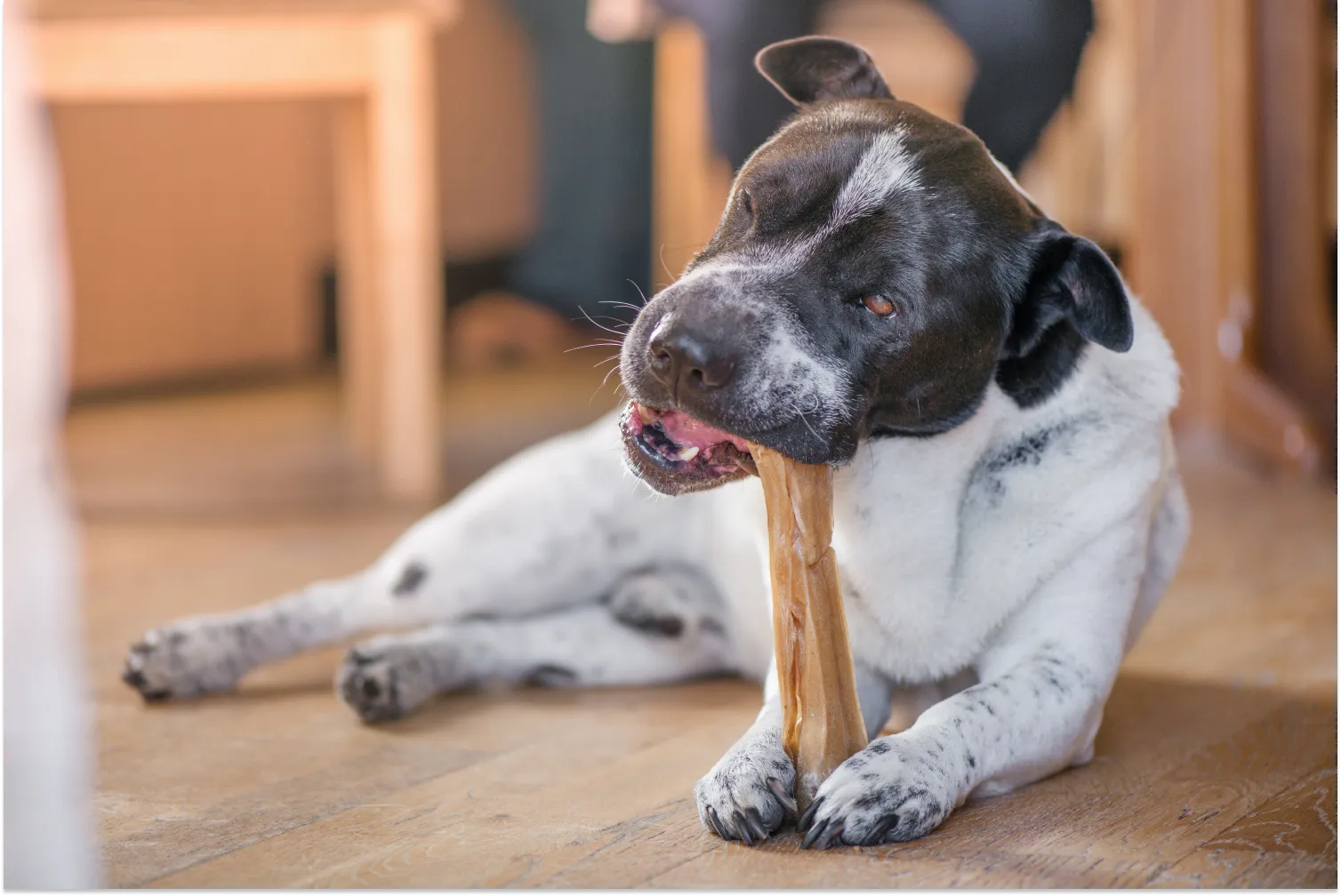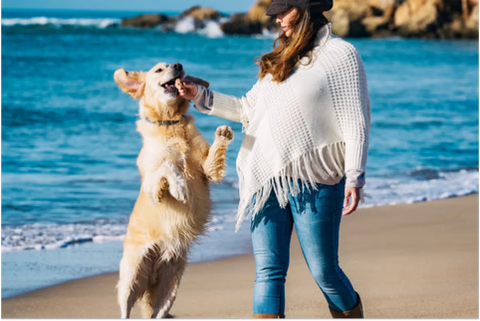
Healthy Bones for Dogs To Chew
As a responsible pet owner, one of your primary concerns is the health and well-being of your beloved canine friend. One area that tends to spark debate among pet owners and veterinarians alike is the bones for dogs to chew on.
You've probably wondered, “Are they beneficial? Are they dangerous? Which bones should I avoid? What alternatives should I consider?”
In this article, we'll delve into these questions and explore the world of canine bone health, ensuring you have all the information necessary to make informed decisions about what's best for your furry friend.
The Importance of Chewing for Dogs
Chewing is more than just a pastime for dogs — it’s a natural and necessary behavior. From the moment they're weaned, puppies use their mouths to explore their surroundings. It’s through chewing that dogs learn about different textures, tastes, and even the limits of their strength.
More than just exploration, chewing plays an essential role in dental health for dogs. As they gnaw on appropriate items, they clean their teeth and gums, helping to remove plaque and tartar build-up.
Chewing on a hard object, like a bone or a dental chew toy, can provide a deep clean that's difficult to achieve with brushing alone. This can lead to healthier gums, fresher breath, and even a reduced chance of developing serious dental diseases.
Chewing also contributes to mental stimulation and can help manage behavior. Dogs, especially those highly active, can benefit from having an appropriate item to chew on. It can alleviate boredom, reduce anxiety, and even deter destructive chewing behaviors.
Chewing is a healthy, instinctual behavior for dogs. The key lies in ensuring they chew on appropriate, safe items that will enhance their well-being rather than put them at risk. In the next sections, we’ll explore the benefits and potential hazards of one such item: bones.
The Benefits of Bones for Dogs
Just as nature intended, bones are a rich source of essential nutrients for dogs. They are packed with calcium and phosphorus — two minerals integral to the health and strength of a dog's skeletal system. Bone marrow also provides vitamins, fat, and protein, contributing to a balanced diet.
But the benefits of bones go beyond nutrition. Gnawing on a bone can significantly improve a dog's dental health. The mechanical action of chewing can help scrape away plaque, reduce tartar build-up, and stimulate the gums, leading to fresher breath and healthier teeth.
Behaviorally, dogs satisfy their natural instinct to chew when given a bone. It keeps them engaged, provides mental stimulation, and can be a great tool for behavioral training.
A bone can provide long hours of occupation, making it a valuable resource for pet owners needing to manage their pet's excessive energy or anxiety.
The Dangers of Bones for Dogs
However, alongside these benefits come potential risks. When dogs chew bones, they are at risk of certain health complications. For instance, aggressive chewers can break down the bone into small fragments, leading to potential choking hazards or digestive blockages if swallowed.
Bones can also fracture a dog's teeth, especially the harder ones like weight-bearing bones from large animals such as cows and deer. Dental fractures can cause severe pain and may require costly veterinary treatment.
Moreover, bones can cause internal injuries. Splintered bone fragments can pierce your dog's esophagus, stomach, or intestines, leading to dangerous and sometimes life-threatening conditions.
The risk level can also vary based on the dog's breed and size. Large, aggressive chewers might break down bones too quickly and ingest harmful fragments, while small dogs may choke on bones that are too large for their size.
In the next section, we'll discuss specific types of bones you should avoid to keep your canine companion safe.
When To Take Your Dog to the Vet
While it's essential to supervise your dog when chewing on a bone or chew toy, it's equally vital to know when to seek professional help. Here are some situations that should prompt a trip to the vet:
- Swallowing Large Pieces: If you notice your dog has swallowed a large piece of bone, chew, or toy, it's essential to take them to the vet as soon as possible. This can potentially cause an obstruction in their digestive system, which is a serious medical emergency.
- Choking or Difficulty Breathing: If your dog begins to choke, cough, or has difficulty breathing while chewing, seek immediate veterinary help. This could be a sign that a piece of bone or toy is lodged in their throat.
- Changes in Eating or Drinking Habits: If your dog stops eating or drinking or struggles when trying to do so, this could be a sign of an oral injury or a foreign body lodged in their mouth or throat.
- Bleeding: If your dog's mouth or gums are bleeding, this may indicate that they have injured themselves on a bone or chew. Any significant or persistent bleeding warrants immediate veterinary attention.
- Changes in Stool: If you observe blood, unusual color, or pieces of bone in your dog's stool, or if your dog seems to have difficulty defecating, it's important to consult your vet. These could be signs of a gastrointestinal injury or blockage.
- Persistent Vomiting or Diarrhea: If your dog has recurring bouts of vomiting or diarrhea after chewing on a bone or toy, they may have an internal injury or obstruction.
- Behavioral Changes: Finally, if your dog is more lethargic than usual, seems unusually anxious, or is pawing at their mouth, these could all be signs of discomfort or pain and should be investigated by a vet.
Your dog can't communicate their pain or discomfort as humans do, so it's crucial to watch for these signs and err on the side of caution. Always consult with a veterinarian to ensure your pet's health and safety when in doubt.
Which Bones To Avoid and Why
Now that we're aware of the dangers, it's crucial to know which bones pose the most risk. Cooked bones, for instance, should never be given to dogs. Cooking alters the structure of the bone, making it more brittle and prone to splintering into sharp pieces when chewed.
Poultry bones, especially from chickens or turkeys, are also risky. These bones are naturally more fragile and can easily break into sharp fragments, even when they're raw. They're often small enough to be swallowed whole, creating a choking hazard.
Despite being a popular choice, rib bones are also one to avoid. These bones are generally thin and can easily be broken into small pieces, which a dog might swallow, causing potential blockages in the digestive tract.
The size of the bone in relation to the dog's size is another critical consideration. A bone should be large enough that your dog can't fit the whole bone in its mouth or swallow it whole. For large breeds, this typically means a bone should be larger than the length of the muzzle.
Safe Alternatives to Bones
Understanding the risks of bones doesn't mean you must deny your dog the joy and benefits of chewing. Numerous safe alternatives to bones can provide the same benefits without the associated risks.
Dental chews, for instance, are designed to clean a dog's teeth effectively and satisfy their urge to chew. They're available in various sizes and hardness levels to suit all breeds and chew strengths.
Rubber chew toys are also a great option. They are durable and long-lasting and provide mental stimulation, especially those that can be filled with treats or peanut butter.
Other natural foodstuffs like sweet potato chews or carrot sticks can provide a healthy and safe chew for your dog. Always choose options appropriate for your dog's size and chewing habits to ensure safety.
Key Factors To Consider When Choosing Bones or Alternatives
When selecting any chewable item, be it a bone or an alternative, several factors should guide your decision.
Firstly, consider the size and age of your dog. Small dogs will need smaller chews, while large breeds require larger ones. Puppies have delicate teeth and should be given softer chews, while adult dogs can handle harder ones.
Chew strength and eating habits also play a role. Dogs who are aggressive chewers will need durable chews that won't break down into swallowable pieces. Conversely, gentler chewers may be fine with softer options.
Finally, keep in mind any allergies or food sensitivities your dog may have. Always check the ingredients of any commercial chew product to ensure it's safe for your pet. When in doubt, consult with your veterinarian.
Conclusion
In conclusion, while bones can benefit our canine companions significantly, they also come with certain risks. As a responsible pet owner, it's crucial to weigh these benefits and risks carefully. Remember to avoid dangerous bone types such as cooked or poultry bones, and consider safe alternatives like dental chews or durable chew toys.
Most importantly, the safety and health of your dog should always be paramount. Always supervise your dog when chewing and make decisions based on their size, age, and chewing habits.
By making informed choices, you can provide your dog with satisfying, beneficial chew experiences that contribute to their overall well-being without compromising their safety. Keep their tails wagging and their jaws healthily busy — your furry friend will thank you!
Sources:
Pet dental care | American Veterinary Medical Association
The Nutritional Aspects of Bone Composition | PetMD
Symptoms And Treatment Of A Broken Tooth In Dogs | Kingsdale Animal Hospital
What to do if your dog swallows a bone, ball or other 'foreign body' | Vets Now
Top Stories

Why Do Dogs Lick Their Paws?

Why Do Dogs Whimper & Make Noises in Their Sleep?

Healthy Vet-Approved Homemade Dog Food Recipes

How To Cook Sweet Potatoes for Dogs






















